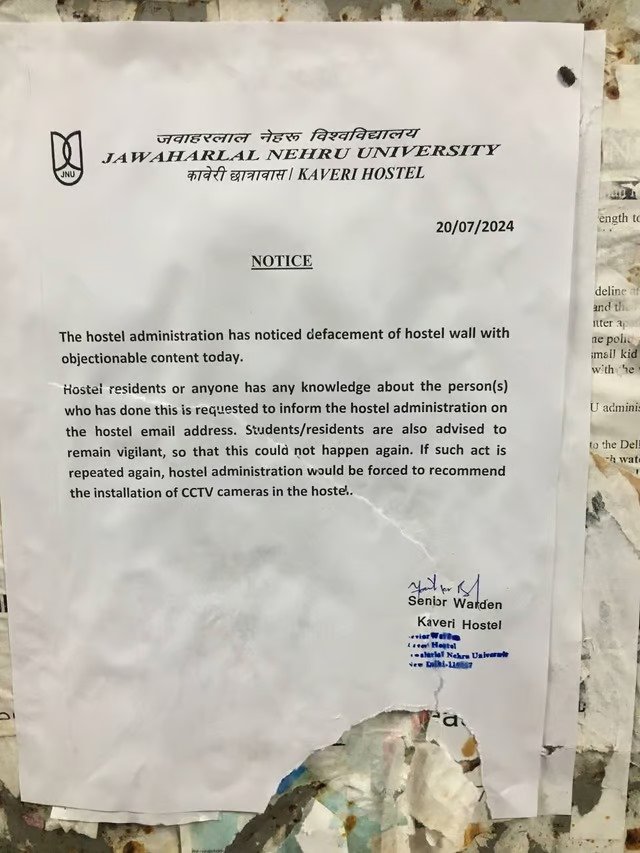Casteist and communal messages were found on Kaveri Hostel walls; students and leaders demand immediate action
Mohammad Alamullah | Clarion India
NEW DELHI — Objectionable casteist and communal slogans were found on the walls of Jawaharlal Nehru University (JNU) at the weekend (July 20). Slogans such as “Chamar Bharat Chhodo,” “Dalit Bharat Chhodo,” “Brahmin-Bania Zindabad,” and “Hindu-RSS Zindabad” were found defacing the Kaveri Hostel of the prestigious institution, causing a significant uproar among the student body. Students expressed their strong disapproval, leading the student union to organise a protest march on Saturday evening.
When Clarion India visited the hostel for more information, the walls had already been painted over. Hostel residents said the university administration acted swiftly to cover the slogans after their images went viral on social media.
Kunal Kumar, NSUI General Secretary at the JNU, asked: “The slogans have been erased from the wall, but how will we remove them from the minds of such people?” He emphasised that this incident should not be viewed in isolation, attributing it to the protection that people with such discriminatory ideologies feel under the current government.
JNUSU President Dhananjay voiced strong condemnation of the incident, stating, “The same forces that are in power in the country are also present in the JNU campus. These forces are constantly running their agenda against Dalits, Adivasis, Bahujans, Muslims, and women. We will keep fighting these forces to ensure JNU remains a place of equality and parity.”
Chetan, a resident of Kaveri Hostel, expressed his distress over the incident, highlighting the Brahminical and Manuvadi nature of the slogans and the underlying hatred they reveal. He called for immediate and strict action from the administration against those responsible for spreading hate. Abul Kalam, a member of the Kaveri Hostel committee, added, “Such incidents vitiate the campus environment and spoil social harmony.”
In response to the incident, the senior warden of Kaveri Hostel issued a notice requesting information about the perpetrators and warning of potential CCTV installation. The administration urged hostel students to remain vigilant.

Swati, a student from Sabarmati Hostel, noted that this was not the first such incident on campus. She highlighted the divisive tactics used by some groups, referencing a recent ABVP poster that read “We the Brahmins of JNU.” Swati emphasised the need for sensitisation programmes for students to address the root causes of such behaviour.
This incident is not isolated; similar cases have surfaced in the past, including anti-Dalit and communal comments being publicly made and slogans targeting specific communities. Despite the formation of a committee to investigate such incidents, no concrete actions have been reported. Workshops aimed at sensitising students and staff, once common at JNU, have significantly dwindled.
The increasing frequency of these incidents, combined with the lack of decisive action from the administration, raises concerns about the future of inclusivity and harmony at JNU, one of India’s most prestigious universities.

